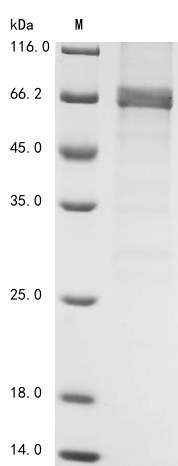Recombinant Mouse 5-AMP-activated protein kinase catalytic subunit alpha-1 (Prkaa1) is produced using a baculovirus expression system and spans amino acids 1-559. This full-length protein carries an N-terminal 6xHis-tag and shows purity greater than 85% when analyzed by SDS-PAGE. The product is designed exclusively for research applications and adheres to rigorous quality standards to meet experimental requirements.
5-AMP-activated protein kinase catalytic subunit alpha-1 (Prkaa1) appears to be a vital component of the cellular energy sensor AMPK complex. It likely plays an important role in maintaining cellular energy homeostasis and participates in pathways that respond to metabolic stress. This protein may prove particularly valuable for research focused on metabolic regulation, potentially offering insights into energy balance and how cells respond to stress.
Potential Applications
Note: The applications listed below are based on what we know about this protein's biological functions, published research, and experience from experts in the field. However, we haven't fully tested all of these applications ourselves yet. We'd recommend running some preliminary tests first to make sure they work for your specific research goals.
Mouse Prkaa1 is a serine/threonine kinase that requires precise folding, proper active site formation, and specific regulatory domain organization for its catalytic activity. The baculovirus-insect cell expression system provides a eukaryotic environment that supports proper protein folding, disulfide bond formation, and some post-translational modifications. However, AMPK kinase activity depends on complex regulatory mechanisms, including phosphorylation at Thr172 and interaction with regulatory subunits. The N-terminal 6xHis-tag may potentially interfere with the protein's N-terminal structural organization or regulatory domains. While the expression system increases folding probability, experimental validation is essential to confirm structural integrity and kinase activity.
1. Protein-Protein Interaction Studies Using Pull-Down Assays
This application requires rigorous validation due to AMPK's complex regulatory mechanism. Functional Prkaa1 interactions with regulatory subunits (β, γ) and upstream kinases require precise tertiary structure and proper phosphorylation status. If correctly folded and functionally active (verified), the protein may be suitable for interaction studies. If misfolded/inactive (unverified), there is a high risk of non-specific binding or failure to identify genuine physiological interactions. The N-terminal His-tag may sterically interfere with regulatory subunit binding interfaces.
2. Antibody Development and Validation
This application is highly suitable regardless of folding status. Antibody development relies on antigenic sequence recognition rather than functional kinase activity. The full-length protein provides comprehensive epitope coverage for generating both linear and potential conformational antibodies. The high purity (>85%) ensures minimal contamination-related issues in immunization protocols.
3. Structural and Biophysical Characterization Studies
These studies are essential priority applications for determining the folding quality and structural integrity of the protein itself, not the native Prkaa1. Comprehensive analysis should include size-exclusion chromatography to assess oligomeric state, circular dichroism spectroscopy to evaluate secondary structure, and thermal shift assays to determine stability. However, the His-tag may interfere with crystallization for high-resolution structural studies.
4. In Vitro Enzyme Kinetics and Inhibitor Screening Assays
This application carries a significant risk without functional validation. AMPK kinase activity requires precise active site formation, proper phosphorylation at Thr172, and correct regulatory domain organization. If correctly folded and catalytically active (verified), the protein may be suitable for kinetic studies. If misfolded/inactive (unverified), enzymatic assays will yield biologically meaningless results. The His-tag may potentially affect substrate access or allosteric regulation.
5. Comparative Species Analysis and Evolutionary Studies
Meaningful comparative studies require native conformation and functional activity. If correctly folded and active (verified), the protein enables valid evolutionary comparisons of kinetic properties and regulatory mechanisms across species. If misfolded/inactive (unverified), comparative analyses would yield misleading evolutionary insights about AMPK conservation and divergence.
Final Recommendation & Action Plan
The baculovirus expression system provides favorable eukaryotic folding conditions for this complex kinase, but the His-tag configuration and AMPK's phosphorylation-dependent activation mechanism necessitate rigorous validation before functional applications. Begin with Application 3 (Structural Characterization) to assess folding quality through SEC, CD spectroscopy, and validate kinase activity through phosphorylation assays and substrate specificity tests. Once correct folding and catalytic activity are verified, proceed cautiously with Applications 1, 4, and 5 for interaction studies, kinetic analyses, and comparative evolutionary research. Application 2 (antibody development) can proceed immediately. Always include appropriate controls: validate kinase activity with known AMPK substrates, test phosphorylation dependence, and consider using tag-free constructs for critical functional studies to minimize potential tag interference.






